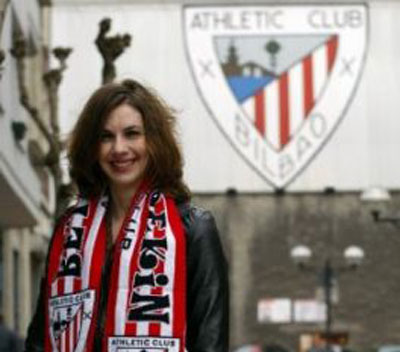basque heritage worldwide

05/20/2013

ADVERTISING
Reno, NV. Hungarian Anthropologist, Mariann Vaczi decided to specialize in the study of Basque culture after spending a month in Donostia and Hendaia in 2004 on a fieldwork scholarship. In 2007, she began her doctorate at the Center for Basque Studies at the University of Nevada, Reno. She was looking for a thesis topic when a friend talk to her about Bilbao’s soccer team, Athletic.
“I had heard that they only use Basque players, so that started me to think,” Mariann says. “I proposed the idea to my PhD advisor, strategically co-proposing with another topic just in case I found the idea of football too frivolous." Luckily, he was thrilled with the idea, as football was an unexplored area in Basque culture studies.
From the anthropologist’s point of view Athletic was a unique tool to study Basque culture. “It is quite intriguing that Athletic limits itself to a small territory in an expanding, globalizing football culture that thrives on athlete migration and commerce. Why does an elite level club choose to maintain a recruitment philosophy that might harm its performance? What does this philosophy tell us about the definitions of Basque identity? What kind of social, cultural and political values are there behind this practice? What do these values tell us about Basque society?” she asked and answered in her thesis.
Athletic and Nationalism
Even though the brith of the club coincides with that of Basque Nationalism, Athletic was founded three years after the formation of the PNV – the anthropologist believeis that the pro-Basque philosophy wasn’t a conscious strategy until 1950. “Until the 1950`s, it was very normal to play local, every other club in Spain did the same. Athletic`s philosophy gains consciousness in contrast to the influx of foreign players to the Spanish league. In the 1940`s and 1950`s Athletic featured almost only Bizkaians; the spectacular successes of those teams consolidated the philosophy of Athletic: the idea that it can be extremely competitive with a strictly local line-up.”
Vaczi also believes that Athletic is as Nationalist as the society that surrounds it. “…it is a symbolic nationalism for many, but not everyone. Many Bilbainos who don`t share the idea of Basque nationalism, and are even against it, go to San Mames and are great Athletic fans. More than symbolic nationalism, I think what is important about Athletic is precisely that it is much more than that. In an ideologically conflicted society, it is perhaps the only institution with which everyone can identify. It is very important for the city to have this source of cohesion. I think Bilbainos are very aware of this, and do their best to keep politics out of Athletic.”
Pride and Sacrifice, two sides of the same coin
Even though using only local players can be a handicap in current competition, the majority of fans support this philosophy. “You might win games less frequently, but when you do, the joy and pride of that victory is far greater than winning with foreigners. The philosophy allows even losses to be celebrated, like the 2009 Cup defeat by Barcelona. It has re-defined the meaning of winning and losing: you have to lose games in order to win tradition and identity. Of course, this philosophy may bring considerable impasses as well, like the catch-22 situation of the bienio negro: if Athletic maintains the philosophy, it might go to second division, where it will be no longer a “unique case in the world of football,” as the l`Equipe said; if it gives up the philosophy, fans will no longer enjoy the game like before. Either way, there is a sense of sacrifice.”
Vaczi believes that this philosophy will continue as long as Athletic can stay in the first division. “Most fans say they`d keep it even in second division, but that remains to be seen.”
The unique philosophy of the club means that Athletic also has fans in other countries according to Vaczi as they see this team like “a David competing in the Liga of Goliaths, or as the Asterix and Obelix of global football. Sports fans celebrate Athletic because it goes against the trends and laws of modern competition, and maintains continuity with the very beginnings of football,” she concludes.
ADVERTISING
ADVERTISING
ADVERTISING
ADVERTISING
ADVERTISING
© 2014 - 2019 Basque Heritage Elkartea
Bera Bera 73
20009 Donostia / San Sebastián
Tel: (+34) 943 316170
Email: info@euskalkultura.eus